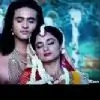Jalandhar-Vrinda: In an episode where the shadows of what lies ahead were already darkening the present, and my spirits, the enchanting, and yet achingly sad scene between Jalandhar and Vrinda was balm for the soul.
It is visualized and written to perfection, and both Mohit and Neha play off each other effortlessly and very effectively. Mohit in particular is superb as the husband pleading with an angry and disapproving wife and, eventually, coaxing her back to him.
I loved it that Vrinda is still a woman of both substance and principle, who not only does not fall on her swami's neck as soon as he deigns to put in an appearance at long last, but also tells him off in no uncertain terms about his kidnapping of Parvati. It was, she declares, while refusing to even look at him, unworthy of a warrior of his calibre.
Perhaps there is a bit of jealousy in all this, or at least Jalandhar thinks so, for he hastens to affirm that he has no interest in Parvati. I found that amusing, a much needed light touch in the midst of the gloom.
I loved it that she puts him firmly in his place, brushing aside his plea that he needs her and that she knows it. The three points she makes - that he is her swami, that she has acknowledged him as her sarvasva, and that she will be a pativrata till her last breath - are all sui generis, so to speak, and independent of anything good or bad that he might do.
Vrinda has a clear-eyed perception of right and wrong, and the forthrightness to voice her ideas on the issues that confront her husband. If Shukracharya had had even a fraction of her moral clarity and her strength of mind, plus her grasp of what tough love should be, Jalandhar would have been saved from the blind alley into which he has boxed himself, and the tragedy that lies ahead.
I loved it that though the magnitude of the crisis he now faces becomes clear to her when he tells her that his guru has left him, she does not give in easily, that even the lost look in his eyes when he says that she too has abandoned him like his mother and his guru, does not produce a strong denial or a immediate move to comfort him. She begins to melt only when he insists that what he now wants the most is not to replace Mahadev, but to have a long and peaceful life with her.
I loved it that this fearless warriot, so macho and so assertive, had to work so hard to bring her round. But of course this is not new for Jalandhar, and he never had any ego where Vrinda was concerned, as we saw earlier when he confessed his feelings for her to her.
As she nestles in his arms, he finally feels secure enough to reveal the despair that now clouds his mind. To lay bare his realization that the kidnapping of Parvati was a a very grave mistake that has turned his world upside down, but which cannot now be set right without mortal consequences for himself. Something that he never did even with his guru.
I never wanted this to happen. Main kya karoon, Vrinda? In that cry from the heart, the strength of the bond between them, so little seen till now, stands revealed. He knows, in his heart of hearts, that though she might judge his actions and himself, and find both wanting, in a crunch, she will, unlike his guru, be always there for him.
The solution she proposes - for him to complete the last stage of her puja with her, which would make him invincible and immortal, so that he could then release Parvati without any danger to himself - is eminently practical. Why then does he not accept it, seeing that he has no objection to the puja per se? In a fascinating display of post-jalasamadhi telepathy, he senses that Mahadev has emerged from his samadhi and that Parvati will soon follow suit. But surely it would have been much more sensible to have completed this vital puja, and then gone across to the mayalok? There are no answers to these questions, but Jalandhar leaves after promising Vrinda that he will be back soon.
Two very touching little vignettes at the end. Before he leaves, Jalandhar holds Vrinda close to him and promises, to her delight, that in their new life together, he will make sure that she is never angry with him, and that she never has cause to complain about him.
Finally, as he is leaving, he turns back to look at her. She is smiling thru her tears. His face is inscrutable, but the eyes are tinged with sadness. Then the lips smile slightly, but the smile never reaches his eyes. Does he have a premonition that this will be the last time he sees her smiling at him, alive and loving? I think he does.
Jalandhar and Parvati:I did not think much of the keenly anticipated encounter between Jalandahar and Parvati. She is quietly confident, even mocking, as she faces this stranger who tries in vain to intimidate her, while he seems to be making a show of bravado, at times excessive, just to keep his spirits up. He clearly has no idea what to do with her, or how to handle her effectively, while she keeps her end up effortlessly. His self confidence has been badly battered, and it is a battle that has been lost even before it has begun.
Pot pourri:I find it interesting that whenever the gods fight any attempt by an outsider to change the status quo, it is always described as being poore sansar ke hit mein. That was Indra's favourite line, and Narada borrows it here. This is the standard operating procedure for all establishments, political, social or economic, and divine as well.I am also curious about how the gods, and snoopers like Narada. can both see and hear everything said in every corner of the trilok, whether it is what Vrinda says to Jalandhar or what Mahadev is saying to Parvati. It is like a permanent CCTV in operation, with shades of Big Brother in 1984. The sheer lack of privacy is alarming, but no one seems to be bothered about it! 😉
For those who want to take a hatchet to me for the above, I shall take refuge in Article 19 of the Constitution or India, one section of which guarantees freedom of thought and speech! Jokes apart, all this was written with tongue firmly in cheek.😉
Shyamala B.Cowsik


























